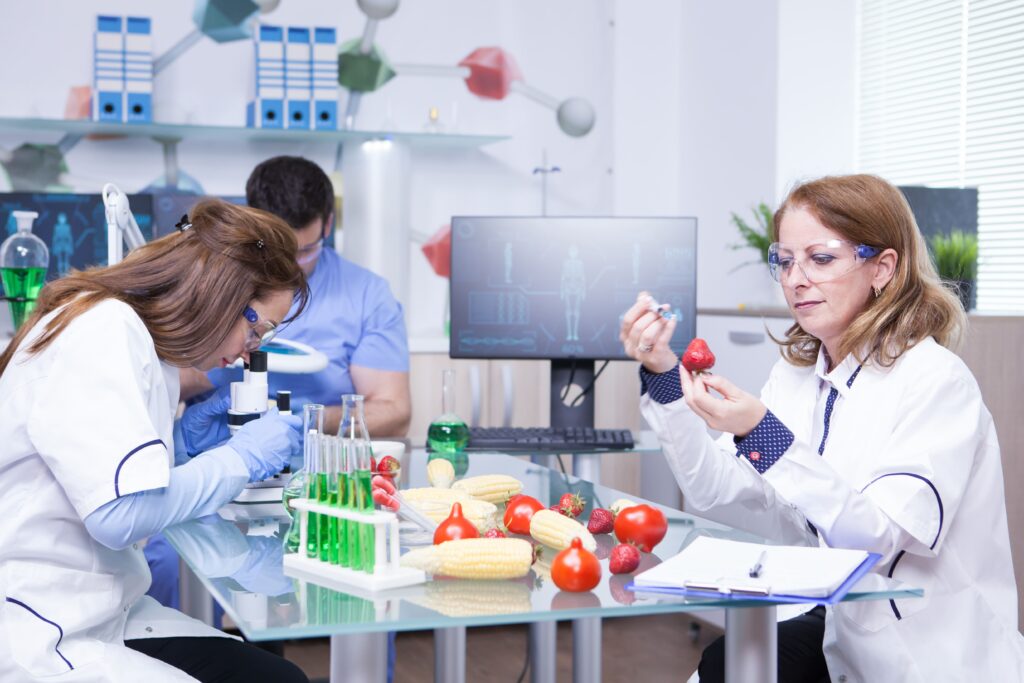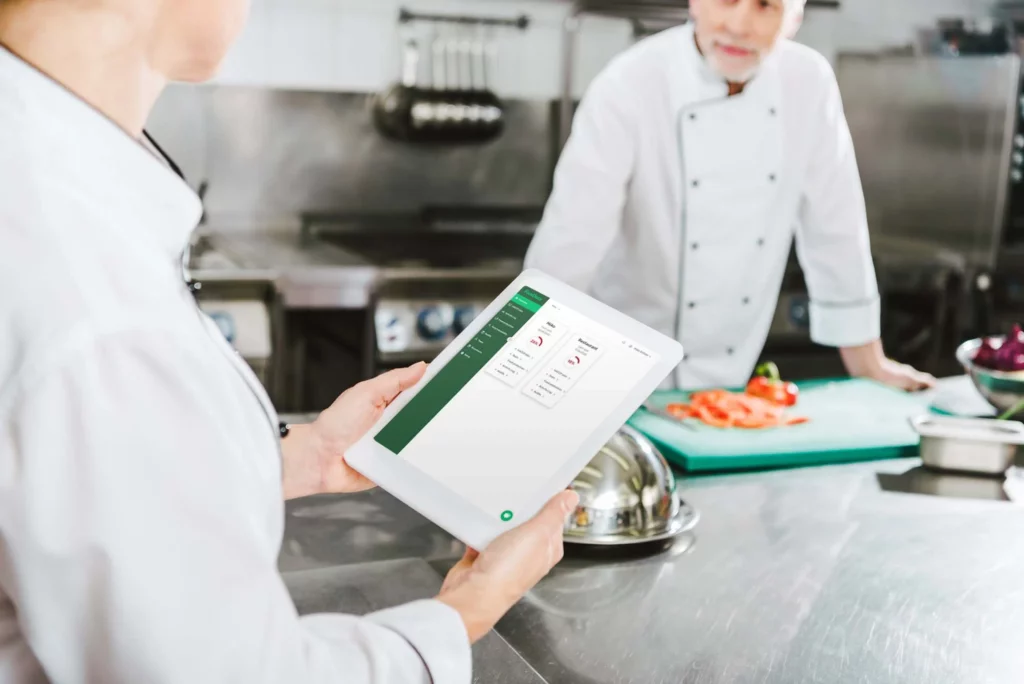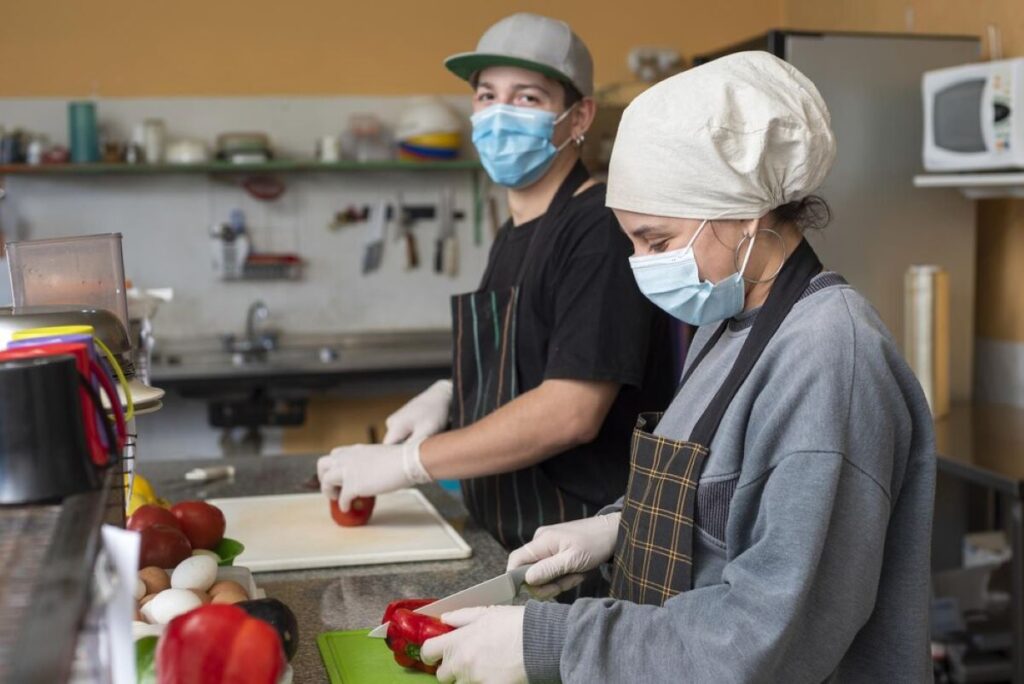Why Is Food Safety Important in the Industry and How Can Food Safety Software Solutions Help?
Food safety is crucial for every successful food-related business. It protects consumers from foodborne illnesses and maintains your brand reputation. The food industry is under increasing pressure to uphold strict safety standards. Contamination incidents can lead to significant financial losses, legal consequences, and permanent damage to customer trust.
Modern businesses face significant compliance challenges:
- Manual record-keeping systems prone to human error
- Difficulty tracking temperature fluctuations across multiple storage areas
- Time-consuming audit preparation processes
- Inconsistent monitoring of critical control points
- Struggle to maintain real-time visibility across operations
Traditional paper-based systems simply cannot keep up with today’s regulatory demands. You need comprehensive solutions that eliminate guesswork and provide concrete evidence of compliance efforts.
Food safety software solutions transform these operational hurdles into streamlined processes. These digital platforms automate critical monitoring tasks, generate accurate records instantly, and provide real-time alerts when issues arise. You gain complete visibility over your food safety protocols whilst reducing the administrative burden on your staff.
When choosing food safety software, you’re investing in more than compliance—you’re securing your business’s future. The right solution prevents costly recalls, reduces waste through better inventory management, and demonstrates your commitment to food industry compliance standards that customers and regulators expect.
What Are Food Safety Software Solutions and Why Are They Essential for Compliance?
Food safety quality and compliance management software refers to digital platforms designed to streamline compliance management, automate record-keeping, and monitor critical control points throughout food operations. These tools serve as comprehensive systems that transform manual processes into efficient, automated workflows while maintaining regulatory adherence.

The Importance of Food Safety Software
The regulatory landscape demands strict compliance with multiple standards:
- FSMA (Food Safety Modernization Act) – Requires preventive controls and hazard analysis
- cGMP (Current Good Manufacturing Practices) – Establishes manufacturing, processing, and handling standards
- GFSI Certifications including:
- BRCGS Food Safety – Global standard for food safety management
- SQF (Safe Quality Food) – Comprehensive food safety and quality programme
- ISO 22000 – International food safety management system standard
Food safety software solutions bridge the gap between complex regulatory requirements and practical implementation. You can use these platforms to meet FDA, State, and USDA requirements through automated documentation, real-time monitoring, and standardised reporting protocols.
Benefits of Food Safety Software
The benefits of food safety software extend beyond basic compliance. These systems:
- Eliminate human error in record-keeping
- Provide instant access to audit trails
- Ensure consistent application of safety protocols across all operational areas
You gain the ability to demonstrate compliance proactively rather than reactively responding to regulatory inspections.
Integration with Existing Operations
Modern food safety platforms integrate seamlessly with existing operations, transforming compliance from a burden into a competitive advantage through enhanced operational visibility and control.
How Do Food Safety Software Solutions Improve Compliance and Operational Efficiency?
1. Compliance Automation
Compliance automation transforms how food businesses manage their regulatory obligations by eliminating time-consuming manual processes. Modern food safety software solutions automatically generate audit trails, maintain digital records, and ensure documentation meets regulatory standards without requiring constant human intervention. You can reduce administrative overhead by up to 70% when implementing automated record-keeping systems that capture critical data points throughout your operations.
2. Real-Time Monitoring Capabilities
Real-time monitoring capabilities provide immediate alerts when critical control points deviate from established parameters. Temperature monitoring sensors integrated with your software platform detect fluctuations in freezers, coolers, and storage areas before they compromise product safety. You receive instant notifications on your mobile device, allowing rapid response to prevent spoilage or inventory loss. These automated alerts eliminate the risk of human error in manual temperature logging whilst ensuring continuous compliance monitoring.
3. HACCP Compliance Processes
HACCP compliance processes become significantly more streamlined through digital workflows and automated documentation. The software guides your team through each critical control point, automatically timestamps entries, and maintains comprehensive records for regulatory inspections. You can customise checklists specific to your operation’s unique HACCP requirements, ensuring consistent application of food safety protocols across all shifts and locations.
4. Operational Efficiency in Food Safety Software Solutions
Operational efficiency in food safety software solutions extends beyond compliance into productivity improvements. Staff spend less time on paperwork and more time on value-adding activities, whilst management gains real-time visibility into operational performance through comprehensive dashboards and reporting features.
What Key Features Should Businesses Look for When Choosing Food Safety Software?
Selecting the right food safety software requires careful evaluation of your operational requirements and compliance obligations. You need solutions that adapt to your specific business environment rather than forcing you to conform to rigid, one-size-fits-all systems.
Tailor-Made Checklists Customized for Specific Operations
Tailor-Made Checklists Customized for Specific Operations represent the cornerstone of effective food safety management. Your restaurant’s temperature monitoring needs differ significantly from a healthcare facility’s meal preparation requirements. Quality software providers like Squizify create customised checklists that reflect your unique workflows, equipment specifications, and regulatory obligations. These personalised checklists ensure you capture every critical control point relevant to your operation whilst eliminating unnecessary tasks that waste valuable time.
Automated Record Keeping Accessible via Internet-Connected Devices for Accuracy and Efficiency
Automated Record Keeping Accessible via Internet-Connected Devices for Accuracy and Efficiency transforms how you manage compliance documentation. You can access, update, and review records from tablets, smartphones, or computers anywhere with internet connectivity. This accessibility eliminates the risk of lost paperwork and ensures real-time data entry accuracy. Staff members can complete inspections using mobile devices, automatically timestamping entries and reducing human error associated with manual record-keeping.
The combination of customisation and accessibility creates a powerful foundation for Food Safety Software Solutions: Choosing the Best Option for Your Business. You gain operational flexibility whilst maintaining strict compliance standards, positioning your business for sustained success in an increasingly regulated industry.
How Does Hardware Integration Enhance the Functionality of Food Safety Software Solutions?
Hardware-software integration food safety software solutions transform basic compliance tracking into comprehensive monitoring systems that protect your business from costly losses. When you combine intelligent sensors with robust software platforms, you create an automated safety net that works around the clock.
The Importance of Temperature Monitoring Sensors
Temperature monitoring sensors represent the most critical hardware integration for food safety operations. These devices continuously track conditions in freezers, coolers, and storage areas, automatically logging data directly into your food safety management system. You eliminate the need for manual temperature checks whilst ensuring complete accuracy in your records.
Proactive Response to Temperature Deviations
The real power emerges when these sensors detect deviations from safe temperature ranges. Your system immediately sends real-time alerts to designated staff members, allowing rapid response before spoilage occurs. This proactive approach prevents inventory loss that could cost thousands of pounds in discarded products.
Expanding Monitoring Capabilities
Modern temperature monitoring solutions extend beyond basic refrigeration units. You can implement sensors for:
- Walk-in freezers and refrigeration units
- Display cases and serving areas
- Transport vehicles for delivery operations
- Food preparation zones requiring specific temperatures
Eliminating Human Error and Strengthening Compliance
The integration eliminates human error from temperature logging whilst providing auditors with precise, timestamped records. Your compliance documentation becomes bulletproof, and you gain peace of mind knowing critical control points receive constant monitoring without requiring staff to remember manual checks throughout busy service periods.
Learn more:Food Safety Manager Software: Tools for Streamlined Operations
Which Industries Can Benefit Most from Implementing Food Safety Software Solutions?
Industries using food safety software span across multiple sectors where food handling and safety protocols are critical to operations. Each sector faces unique challenges that require tailored approaches to compliance management.
Hospitality Sector
Hotels and restaurants operate in fast-paced environments where temperature monitoring, ingredient tracking, and staff compliance documentation become essential. You need systems that can handle multiple kitchen stations, varying menu items, and frequent staff rotations whilst maintaining consistent safety standards.
Healthcare Facilities
Patient meal safety in hospitals and medical centres requires stringent protocols due to compromised immune systems and dietary restrictions. Healthcare facilities must track allergens, monitor food temperatures during transport, and maintain detailed records for patient safety audits. This is crucial as outlined in this guide on food safety practices in healthcare settings.
Aged Care and Child Care Centres
These facilities maintain strict hygiene standards due to vulnerable populations. You require comprehensive documentation for meal preparation, storage protocols, and cleaning schedules. Child care centres particularly benefit from automated systems that track food allergies and dietary requirements across multiple age groups.
Supermarkets and Retail
Inventory compliance in supermarkets involves managing fresh produce, frozen goods, and prepared foods across different temperature zones. You need real-time monitoring systems that alert staff to temperature deviations and automatically log compliance data for regulatory inspections.
Each industry benefits from customised checklists and automated record-keeping that addresses their specific operational requirements and regulatory obligations.

What Makes Squizify Different from Other Food Safety Software Providers?
Squizify offers a complete compliance solution that combines operational excellence with strong food safety management features. This unique approach sets it apart from competitors who usually focus on either compliance or operations, but rarely excel at both at the same time.
Customised Checklists for Your Business
The platform’s strength lies in its customised checklists that adapt to your specific operational needs. You can personalise these checklists through discovery calls and demo sessions, ensuring the software perfectly matches your business processes instead of forcing you to conform to inflexible, generic solutions.
Automated Record Keeping for Accuracy
Automated record keeping is another key feature that makes Squizify stand out. The system collects data through internet-connected devices, eliminating manual entry errors while meeting the accuracy and efficiency standards required by regulatory bodies. This automation goes beyond basic data collection and includes thorough auditing capabilities that streamline your compliance workflows.
Secure Cloud-Based Solution
The platform operates as a secure SaaS solution with 24/7 data accessibility, allowing your team to monitor compliance status and operational metrics from anywhere. This cloud-based structure ensures your food safety data remains secure while providing the flexibility modern businesses need.
Integration with Hardware Devices
Squizify’s ability to integrate with hardware devices enhances the software’s functionality through temperature monitoring sensors and food label printing solutions. These connected devices create a complete system that automatically monitors critical control points, reducing the risk of human error in your food safety protocols.
Employee Onboarding Software
In addition to its robust food safety features, Squizify also incorporates elements of employee onboarding software into its platform. This ensures that all staff members are thoroughly trained on food safety protocols and compliance measures right from the start, further enhancing operational efficiency and reducing the likelihood of errors.
What Are the Benefits of Using a Secure SaaS Platform for Food Safety Management?
SaaS benefits food safety software solutions by transforming how you manage compliance and operational tasks across your organisation. Cloud-based platforms eliminate the constraints of traditional desktop software, giving you unprecedented control over your food safety operations.
24/7 Data Accessibility and Real-Time Management
Your team can access critical food safety data from any internet-connected device, whether you’re using a smartphone during a walk-through inspection or a tablet in the kitchen. This constant connectivity means you can respond to temperature alerts, complete compliance checklists, and review audit reports from anywhere in your facility or remotely.
The secure SaaS architecture ensures your data remains protected whilst maintaining instant availability. You don’t need to worry about server maintenance, software updates, or data backups – these critical functions happen automatically in the background.
Enhanced Operational Flexibility
Multiple team members can simultaneously access and update records without conflicts or version control issues. Your kitchen staff can log temperature readings whilst your manager reviews compliance reports, all happening in real-time through the same secure platform.
This flexibility proves invaluable during audits when inspectors require immediate access to historical data. Instead of scrambling through paper records or waiting for desktop computers to load, you can instantly pull up any required documentation through your mobile device, demonstrating your commitment to transparency and compliance excellence.

How Can Businesses Effectively Onboard and Utilize Food Safety Software Solutions?
Onboarding food safety software solutions requires a strategic approach that goes beyond simple software installation. You need personalised guidance to ensure your team maximises the platform’s capabilities from day one.
The Power of Personalised Demonstrations
Effective onboarding begins with comprehensive demonstrations tailored to your specific operational needs. Providers like Squizify offer “Book a Demo” options that allow you to:
- Explore features relevant to your industry sector
- Understand how the software integrates with your existing workflows
- Identify customisation opportunities for your unique requirements
- Ask specific questions about compliance challenges you face
Discovery Calls: Your Foundation for Success
Quality food safety software providers conduct thorough discovery calls before implementation. These sessions help identify:
- Your current compliance gaps
- Specific regulatory requirements for your industry
- Team training needs and technical capabilities
- Integration requirements with existing systems
Customisation Through Expert Guidance
During the onboarding process, you’ll work with specialists who understand both the software capabilities and your industry’s compliance landscape. This collaboration ensures your checklists, monitoring protocols, and reporting structures align perfectly with your operational reality.
The most successful implementations occur when businesses engage actively during these initial phases, providing detailed information about their processes and asking targeted questions about functionality. This investment in proper onboarding translates directly into faster adoption rates and improved compliance outcomes across your organisation.
Conclusion
Choosing the best food safety software solution requires careful consideration of your business’s unique operational needs and compliance requirements. You need a platform that combines powerful features with dependable support.
Prioritise secure SaaS platforms that offer:
- 24/7 data access from any device with internet connection
- Comprehensive customer support including live chat assistance
- Proven success across various industries
- Flexible solutions that grow with your business
The right food safety software turns compliance from a burden into a competitive advantage. You deserve a solution that not only meets regulatory standards but also improves your operational efficiency. Platforms like Squizify show how Food Safety Software Solutions: Choosing the Best Option for Your Business becomes simple when you work with providers who are dedicated to your long-term success through personalised onboarding and ongoing support.
Click heare:Food Safety Manager Software: Tools for Streamlined Operations